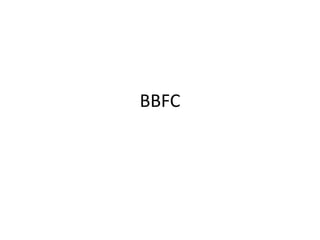
Bbfc
- 1. BBFC
- 2. When was the BBFC established- for what reason? The British Board of Classification was established in 1912, it was designed by the film industry to enforce order to the film classification. This was because of the Cinematographers Act in 1909, which was when Police and other Authorities had the power to enforce laws about the licenses for cinemas in that area.
- 3. What media forms do they regulate? The BBFC regulates: films, videos, DVDs and certain video games, advertisements and trailers under the Video Recordings Act (1984).
- 4. How are they funded? BBFC is a non-governmental body; funded through the fees it charges to those who submit films and video works for classification.
- 5. What legislation do they have to abide by? • Video Recording Act (1984) • The Human Rights Act (1998) • The Obscene Publications Acts (1959 and 1964) • The Protection of Children Act (1978) • The Criminal Justice and Immigration Act (2008) • The Public Order Act (1986) • The Cinematograph Films (Animals) Act (1937) • The Animal Welfare Act (2006) • Coroners and Justice Act (2009)
- 6. What is the process of classification? Classical departments to help make the classification process work: • Information Services • Technical / Archive • Information Systems • Accounts • Facilities Films that are given to the BBFC are put through their system at the reception by the Facilities department. The Information Services department takes on the task of any research that needs to be done for a work, which is when the Technical department times the DVD and checks the quality of the disc. The Projectionist measures the duration of the film, during a viewing. The Information System department measures video games and are responsible for the internal information, including its website. The distributer then gets a bill, which they have to pay for to the Accounts department. A schedule is devised which has all incoming DVDs that the BBFC needs to check. Information Services also handle all customer queries and ensure that they are informed of our classification decisions. The Archive department maintains an archive of every single video and DVD work that has been submitted to the Board, as this is a legal requirement.
- 7. What is Consumer Advice? Consumer Advice is a brief description of the content which determined the classification of a film, DVD or video game. As well as noting particular issues such as violence, sex, language, drugs or any other matters likely to be of concern, it can also highlight themes, such as suicide, or contexts, such as comedy or fantasy, which can influence the strength of the material. At the junior categories Consumer Advice can also warn of behaviour which may be potentially harmful if copied, or highlight content, such as characters in dangerous situations, which might frighten or upset younger viewers.
- 8. Create a timeline: give a historical perspective on legislation- what has been acceptable in which eras? Give examples.. Cinematograph Act 1909 1960’s 1970’s 1980’s Cinematograph Act 1952 1990’s 2000- Cinematograph Act 1982 Within each era a new film came out that was arguably respectable for that year. However, many world argue that the films that came on our screens and in the cinemas were perhaps ones that audiences weren’t ready for. Although some would say that the audience need get ready for scarier, nastier, sexual movies because that’s what we see now a days; but around the 1900’s people were desensitized to violence and sex. Each legislation was put in place, to help regulate what people see, for example; Snow White is a movie that pretty much anyone can watch, compared to something like James Bond, which promotes; sex and violence, only 50/60 years later. To regulate who watches it, of what ages and where, to try and stop young children watching things that they don’t need to see. From the 1990’s to the 2000’s people have become less interested about what their children watch, which is why children are liable to go behind their parents back and watch things that aren’t regulated to their age; which is why the internet is such a dangerous place for young people.